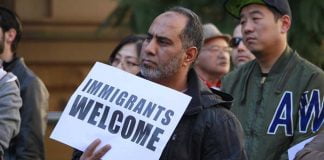Thousands have taken to the streets of US cities in a new wave of Black Lives Matter protests, enraged by the police murder of two more black men.
Millions of people have viewed the shocking videos of the two deaths. One shows Alton Sterling being shot several times while pinned to the ground by two white police officers. According to witnesses, Alton never wielded his gun or threatened the officers.
Philando Castile was pulled over and shot while driving with his girlfriend and her four-year-old daughter. Philando’s girlfriend immediately started live-streaming. She said Philando, “let the officer know that he had a firearm and he was reaching for his wallet and the officer just shot him in his arm”.
Young black males are nine times more likely to be the victims of police killings in the US.
This is just part of everyday discrimination from police. Blacks account for 35 per cent of drug arrests and 55 per cent of convictions even though they are only 14 per cent of the population and use and sell drugs at equal rates to whites. Blacks are disproportionately pulled over while driving and three times more likely to be searched. And they are over-represented on death row.
Using street demonstrations, die-ins, and blocking traffic, the Black Lives Matter movement has put the US police’s callous disregard for black lives in the national spotlight.
In January 2015, following the murder of Michael Brown, 56 per cent of white Americans saw police violence as the result of “isolated” incidents. In just three months, following the murder of Freddie Grey, that figure had plunged to 36 per cent.
Thousands have marched in solidarity here, drawing links with black deaths in custody. In Sydney, Aboriginal activists read a message from David Dungay senior, whose son died in custody in December, saying:
“I remember one story about a black man, Eric Garner in New York City being held to the ground by police. He was saying ‘I can’t breathe’ …
“My son was also crying out ‘I can’t breathe’. The guards were saying to him, ‘you can breathe David, you’re talking.’ Yet a few minutes later he was dead … I want it known what has happened to my son and what is happening to black people in this country. And I want justice.”
Backlash
Right-wing politicians and media outlets in the US have counter-attacked, accusing the Black Lives Matter movement of fostering racial divisions and violence against police.
Following the killing of five Dallas police officers by Afghan war veteran Micah Xavier Johnson, the demands on Black Lives Matter to shut up reached a crescendo. Barack Obama personally travelled to Dallas to attend their funerals—something he has refused to do for the black victims of police killings.
But activists have refused to be bullied. “I won’t say Blue Lives Matter” wrote Natasha Lennard, “because it does not need to be said….[those Dallas killings] provoked an immediate response from the president… dozens of unarmed Black men killed by cops go without presidential comment…That’s what not mattering looks like”.
Some argue it is possible to reform the police by weeding out the bad apples and giving police better training, but this fundamentally misunderstands their role.
As much as the police like to promote themselves as defending ordinary people against crime, their real role is to defend economic inequality. There are over 400 billionaires in the US alongside more than 45 million people living in poverty.
It would be impossible to maintain this inequality without; first the ideology that says it’s fair; but also the laws, the courts, the prisons, and the police that keep people in their place. It is no accident that our prisons are overwhelmingly full of people from poor backgrounds.
It’s this daily role of maintaining “order”; responding to business owners who complain about break-ins; patrolling the streets looking for potential law breakers; moving-on the homeless if they congregate and interfere with commerce, which ingrains racist indifference in police.
They soon learn there is a hierarchy and it’s the young, the working class, and particularly blacks, who are at the bottom of the pile.
Rather than see petty crime, excessive use of drugs and alcohol, homelessness and interpersonal violence as symptoms of inequality, they absorb the racist ideology promoted by right-wing politicians and newspapers that blame the victims for their own circumstances.
They begin to see the higher rates of homelessness among blacks as the product of them being “naturally” lazy and to see black youth as “predisposed” towards criminality.
The struggle against police racism can’t be neatly separated from the struggle against the system that creates such gross economic inequality and the role of the police in defending it.
By Mark Gillespie




